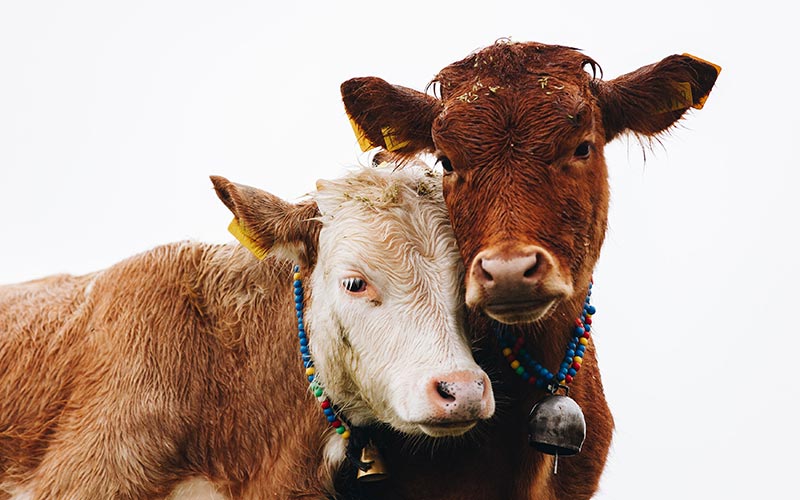Does the argument "I eat very little meat - and when I do, it's only from happy animals." sound familiar? Maybe you've heard it before or even said it yourself. I definitely used to use it rather unconsciously to make myself feel a little better. But as a flexitarian and part-time vegetarian, is that really justified? In addition, the fact that we Germans eat an average of 60 kilograms of meat per year₁ leaves room for doubt that you really only eat a little meat.
So here I would now like to question whether the argument "I only eat a little meat" makes sense - and whether you can really ensure that the meat comes from happy animals. Let's go!
Why it is inconsistent to eat little meat now
I used to think that was a good compromise, too. And in fact, it's also an important step to make meat something special again and not something that continues to be eaten every day. Depending on your personal motive, you ultimately show that animal welfare, the environment and your own health are important to you. But on the one hand "only little meat" difficult to define and control, on the other hand you live continue at the expense of animals, the environment and their own health. Either way, an animal must be killed for you. The cow that you eat very little of must also be put out to pasture for you. It must eat soybean meal, for which the Rainforests cut down and it emits methane, which is a major contributor to the Climate Change contributes.
And even if you eat little meat, you're still regularly eating something that has been proven to be unhealthy for your body, contains antibiotics and, for example, triples the risk of heart disease compared to a plant-based diet.₂
How do you even know that an animal was happy?
How can you be absolutely sure that all the meat comes from happy animals? After all, about 98 percent of the meat in Germany comes from the Factory Farming.₃ The organic content of meat and sausage products is just under 2 percent₄ - and even organic products may have been produced in intensive livestock farming. So do we also ask the butcher we trust where the feed comes from, how high the antibiotic content in the meat is, how dark and cramped the barn was? That would be quite complicated every time at the meat counter. But if we don't ask these questions, we have no guarantee that the meat is healthy for your body and comes from "happy animals".
So it would be incredibly restrictive to consistently make sure to only eat meat from "happy" animals. There it is still much easier to directly live vegan and to consume no more animal products at all. Then the animal would definitely be happy, as it would not have to be gassed, shredded or dismembered for an immoral reason.
But apart from the fact that it's hard to be sure: your dog is a happy animal - should you therefore take its life? Why should you do that to a cow, a pig or a chicken? In the end, there is simply no animal that likes to die. But even if you eat only a little meat, the animal loses its life for your desire for meat.
Tip: More about the Emotionality of animalsyou can read in the linked article.
Eating little meat continues to demand great sacrifices

The argument "eat only little meat" is simply too vague. In my own experience, many people do not even consider fish or sausage slices, for example, to be "meat". Many have already forgotten that there is an animal behind it.
Yes, you can now claim that Veganism too extreme is - that is, of course, a matter of opinion. But if one's own diet demands sacrifices because it is based on the expense of the environment, animals and health, everyone must weigh up for themselves what is more important to them. If you, too, value your health, the life of an animal and the continued existence of our planet more than your personal taste experience, then you should simply refrain from eating meat altogether. It has never been so easy as it is today.
Do you have questions, suggestions or your own experiences with the argument "eat only little meat"? Then share them in the comments!
Stay sustainable,

PS.: I can only warmly recommend you to use these vegan documentaries to watch. After that you know all Reasons for the plant-based diet and are doubly and triply motivated to stop consuming animal products altogether. That's how it was for me too 🙂
References:
₁ Statista GmbH: Per capita consumption of meat in Germany from 1991 to 2019 (April 2020), available at https://t1p.de/oorx. [07.05.2020].
₂ National Institutes of Health: Eating red meat daily triples heart disease-related chemical (Accessed 08 Jan. 2019), Available from: https://t1p.de/avcc. [07.05.2020].
₃ Bayerischer Rundfunk: Tierwohllabel - ein Ausweg aus der Massentierhaltung? (Oct. 05, 2022), available at https://t1p.de/ujyi. [17.07.2020].
₄ Fleischwirtschaft.de: Sales growing (as of Feb. 13, 2019), available at https://t1p.de/60gl [27.07.2020].






